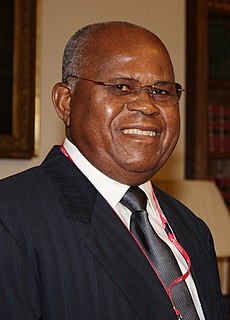
Politics of the Democratic Republic of Congo take place in a framework of a republic in transition from a civil war to a semi-presidential republic.

Zaire, officially the Republic of Zaire, was the name of a sovereign state between 1971 and 1997 in Central Africa that is now known as Democratic Republic of the Congo. The country was a one-party totalitarian dictatorship, run by Mobutu Sese Seko and his ruling Popular Movement of the Revolution party. Zaire was established following Mobutu's seizure of power in a military coup in 1965, following five years of political upheaval following independence known as the Congo Crisis. Zaire had a strongly centralist constitution, and foreign assets were nationalised. The period is sometimes referred to as the Second Congolese Republic.

Patrice Émery Lumumba was a Congolese politician and independence leader who served as the first Prime Minister of the independent Democratic Republic of the Congo from June until September 1960. He played a significant role in the transformation of the Congo from a colony of Belgium into an independent republic. Ideologically an African nationalist and Pan-Africanist, he led the Mouvement National Congolais (MNC) party from 1958 until his assassination.

Joseph Kasa-Vubu, alternatively Joseph Kasavubu, was the first President of the Republic of the Congo (1960–65), today the Democratic Republic of the Congo.

Moïse Kapenda Tshombe was a Congolese businessman and politician. He served as the president of the secessionist State of Katanga from 1960 to 1963 and as prime minister of the Democratic Republic of the Congo from 1964 to 1965.

The Congolese National Movement is a political party in the Democratic Republic of the Congo.

The Congo Crisis was a period of political upheaval and conflict in the Republic of the Congo between 1960 and 1965. The crisis began almost immediately after the Congo became independent from Belgium and ended, unofficially, with the entire country under the rule of Joseph-Désiré Mobutu. Constituting a series of civil wars, the Congo Crisis was also a proxy conflict in the Cold War, in which the Soviet Union and the United States supported opposing factions. Around 100,000 people are believed to have been killed during the crisis.

Étienne Tshisekedi wa Mulumba was a Congolese politician and the leader of the Union for Democracy and Social Progress (UDPS), the main opposing political party in the Democratic Republic of the Congo (DRC). A long-time opposition leader, he served as Prime Minister of the country on three brief occasions: in 1991, 1992–1993, and 1997.
Evariste Kimba Mutombo served briefly as the Republic of the Congo's prime minister from October 18 to November 25, 1965. A protégé of President Joseph Kasavubu, he fell foul of Kasavubu's main enemy Joseph Mobutu, who became the chief Congolese strongman in November 1965. Mobutu subjected Kimba to a show trial and had him sentenced to death on charges of high treason. In June 1966 Kimba was hanged before a vast crowd in Kinshasa, along with other ex-ministers Jérôme Anany, Emmanuel Bamba and André Mahamba.

A constitutional referendum was held in the Republic of the Congo (Léopoldville) between 25 June and 10 July 1964. The new constitution, known as the "Luluabourg Constitution", changed the country's system of government, its name, and the number of provinces. It was approved by 91% of voters.

General elections were held in the Democratic Republic of the Congo between 18 March and 30 April 1965, following the promulgation of a new constitution approved by a referendum the previous year. 223 political parties contested the election for 167 seats in the Chamber of Deputies.

Parliamentary elections were held in the Democratic Republic of the Congo on 15 November 1970. Voters were presented with a single list from the Popular Movement of the Revolution (MPR), the party of President Joseph Mobutu. They only had the choice of voting "yes" or "no" to the list of 420 candidates for the National Assembly, who had been chosen from 2,500 applicants at the party's congress on 19 September 1970. As with the presidential election earlier in the month, the voters approved the candidates with over 99% of the votes.

Parliamentary elections were held in Zaire on 2 November 1975. At the time, the country was a one-party state with the Popular Movement of the Revolution (MPR) as the only legally permitted party. Voters approved a single list of 244 MPR candidates. Instead of the "costly and complicated" system of casting ballots, the election took place by "acclaim." Candidates were simply presented at public locations such as stadiums, and the audience cheered for them.

Presidential elections were held in Zaire on 3 December 1977. At the time, the country was a one-party state with the Popular Movement of the Revolution as the only legal party. Its leader, incumbent president Mobutu Sese Seko, was the only candidate, with voters asked to vote "yes" or "no" to his candidacy. The results showed 98.2% of voters casting a "yes" vote.

Presidential elections were held in Zaire on 29 July 1984. At the time, the country was a one-party state with the Popular Movement of the Revolution as the only legal party. Its leader, incumbent president Mobutu Sese Seko, was the only candidate, with voters asked to vote "yes" or "no" to his candidacy. The results showed 99.16% of voters casting a "yes" vote.
Justine M'Poyo Kasa-Vubu is a Congolese politician and leader of a small political party, the Movement of the Congolese Democrats, for whom she stood as a Presidential candidate in the 2006 elections.
On 5 September 1960 President Joseph Kasa-Vubu of the Democratic Republic of the Congo dismissed Prime Minister Patrice Lumumba from office. He also dismissed six other members of his government: Deputy Prime Minister Antoine Gizenga, Minister of Justice Rémy Mwamba, Minister of Interior Christophe Gbenye, Minister of Information Anicet Kashamura, Secretary of State Antoine-Roger Bolamba, and Secretary of State Jacques Lumbala.















